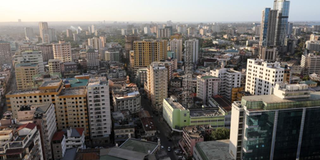Tanzania listed among top economic performers in Africa for 2024, beating Kenya and Uganda

Dar es Salaam City Skyline. FILE PHOTO | XINHUA
What you need to know:
- AfDB projects that Tanzania’s economy will grow by 6.1 percent, ahead of its East African peers except Rwanda which will grow by 7.2 percent.
Dar es Salaam. According to the African Development Bank (AfDB) Tanzania's economic growth will beat that of Kenya and Uganda in 2024 even as East Africa is projected to continue to lead Africa’s growth momentum.
In a new report titled Macroeconomic Performance and Outlook (MEO), the AfDB projects that Tanzania’s economy will grow by 6.1 percent, ahead of its East African peers except Rwanda which will grow by 7.2 percent.
Tanzania is also ranked ninth among the top 11 African countries whose economies are projected to performance well behind Niger (11.2 percent), Senegal (8.2 percent), Libya (7.9 percent), Rwanda (7.2 percent), Côte d’Ivoire (6.8 percent), Ethiopia (6.7 percent), Benin (6.4 percent), and Djibouti (6.2 percent).
Completing the list are Togo and Uganda which are projected to grow at 6 percent each.
AfDB’s president Dr Akinwumi Adesina said it’s projected that growth on the continent will rebound to 3.8 percent in 2024, and the growth will be broad-based, although domestic supply bottlenecks such as shortfalls in electricity generation are still lingering.
“Fiscal deficits have improved, as faster-than-expected recovery from the pandemic helped shore up revenue. This has led to a stabilization of the average fiscal deficit at 4.9 percent in 2023, like 2022, but significantly less than the 6.9 percent average fiscal deficit of 2020,” he said.
According to Dr Adesina, the stabilization is also due to the fiscal consolidation measures, especially in countries with elevated risks of debt distress.
“We project that economic growth will regain moderate strength as long as the global economy remains resilient, disinflation continues, investment in infrastructure projects remains buoyant, and there is sustained progress on debt restructuring and fiscal consolidation,” he said.
Dr Adesina stated that persistent inflation and rising geopolitical tensions remain key risks to growth as they could disrupt trade and investment flow and push up food and commodity prices.
In a statement provided by the AfDB, the Chief Economist and Vice President, Prof Kevin Urama attributed the growth in Africa’s top-performing economies to declining commodity dependence through economic diversification, increasing strategic investment in key growth sectors, and rising both public and private consumption, as well as positive developments in key export markets.
“Africa’s economic growth is projected to regain moderate strength as long as the global economy remains resilient, disinflation continues, investment in infrastructure projects remains buoyant, and progress is sustained on debt restructuring and fiscal consolidation,” he said.
African Union Commission’s commissioner for Economic Development, Trade, Tourism, Industry and Minerals, Ambassador Albert Muchanga remarked that the future of Africa rests on economic integration.
“Our small economies are not competitive in the global market. A healthy internal African trade market can ensure value-added and intra-African production of manufactured goods,” he said.
According to Ambassador Muchanga, the report will be useful when the African Union makes its proposals to the G20- an informal gathering of many of the world’s largest economies to which the African Union was admitted last year.
Also read: Tanzania among top economies in 2023





